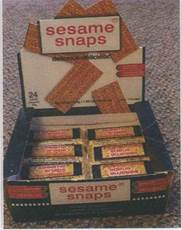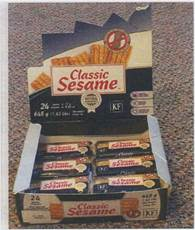Agros Trading Confectionery SPZOO v K-Max Corp, 2015 ONSC 3166
This case is an example of one company, who was sued for trade-mark infringement, attempting to evade the court ruling by incorporating a new company to continue selling the infringing products. Even though the infringement was taking place under new companies, infringers were still bound by an injunction preventing them from selling the infringing goods.
Background
Sesame Snaps® is a well-established brand name for sesame candy and has been in use in Canada since 1971. [3] In mid-2012, however, a former distributor of Sesame Snaps® began to compete with its own version of sesame candy under the name Classic Sesame™. This new competitor, led by Krzysztof Werocy, was very knowledgeable of the Sesame Snaps® branding and packaging. The packaging for Classic Sesame™ that Werocy used was highly similar to that of Sesame Snaps®. [9] As a result, the makers of Sesame Snaps®, Agros Trading Confectionary SP. Z. O. O. (“Agros”), sued Werocy’s company for trade-mark and copyright infringement, and essentially passing of the Classic Sesame™ candies as Sesame Snaps®. [11]
[one_second]


[/one_second]
The action was undefended. As a result, the Court ordered the default judgment: an injunction preventing the sale and use of the Classic Sesame™ branding and packaging. [7-8] However, the judgment was not issued until January 2015, and in the meantime Werocy sought to avoid the injunction by setting up a new corporation to continue to sell Classic Sesame™. Werocy set up the new corporation for the express purpose of purchasing the assets of the old infringing corporation, including its intellectual property in the branding and packaging of Classic Sesame™, and continuing on the business of selling Classic Sesame™. [13]
Werocy named the new corporation K-Max (2013) Corporation (“K-Max”). [1] Werocy also partnered with another former distributor of Sesame Snaps®, James Picard, who ran Exclusive Candy and Novelty Distributing Limited (“Exclusive”). [10] K-Max began selling Classic Sesame™ directly to its former customers of Sesame Snaps®. [17] Some customers asked about the change in brand, but others did not seem to notice. [17]
When the final order from the 2012 infringement case was issued in 2015, the Court also added K-Max and Exclusive to the injunction.
The Procedural Defence
K-Max and Exclusive (the “Moving Parties”) objected to being named in the injunction since they were never a party to the initial infringement suit. The crux of their argument was that if they were not party to the initial litigation, the injunction could not be awarded against them. They sought to set aside the injunction, [20] but also took the opportunity to argue, in their own right, that the Classic Sesame™ that they were selling (and particularly the packaging) did not in fact infringe the trade-marks or copyright of Sesame Snaps®. [8]
The Court decided that it was not necessary for K-Max and Exclusive to be served with a statement of claim and brought into the initial litigation. [20] K-Max and Exclusive were both already aware of the litigation, through their principals Werocy and Picard. [20]
Trade-mark Infringement and Passing Off
On the issue of trade-mark infringement and passing off, the Moving Parties argued that the previous judge erred when he concluded there would be confusion between the two products since there was no expert evidence on which he could rely. [29] The Court, however, disagreed, and held that the judge was properly situated to make the analysis on his own. He rightly considered whether, as a first impression, if the casual consumer would likely be confused, [31] without the need for expert evidence. [33] The Court also rejected the Moving Parties’ insistence that Agros should have provided survey evidence. The Court expressed considerable doubt as to how helpful such evidence would be, going so far as to say that survey evidence may well have served to confuse the judge, rather than assist him. [37]
The Court then conducted its own comparison between the two products’ packaging and agreed that the two products were confusingly similar. [38] In fact, considering all the evidence, the Court thought it clear that the Moving Parties “went out of their way to find a product that would sow confusion in the mind of the consuming public, and that they succeeded in this task”. [42] The Court upheld the injunction against K-Max and Exclusive. [61]
Copyright Infringement
In the initial infringement case, the Classic Sesame™ packaging was also found to be infringing the copyright of the Sesame Snaps® packaging. The Moving Parties attempted to run another procedural defence, by arguing that Agros, as a Polish corporation, could not assert its copyright in Canada. [44] This argument was rejected. Poland is a treaty country to the Berne Convention and therefore can enforce its copyright in Canada. [44-47]
Commentary
In one sense, this case is a classic passing off case. The Court’s comments about the lack of the requirement for expert evidence or survey evidence is consistent with the growing acknowledgment among Courts that such evidence is often not very helpful in trade-mark infringement and passing off cases.
In another sense, this case serves as a telling example of the power of intellectual property to protect your business, even where an infringer seeks to avoid the Courts with corporate tricks. The new corporations that carried on selling the infringing products were included in the injunction, even though they were not initially served with a statement of claim, by virtue of Werocy and Picard’s knowledge of the initial litigation.